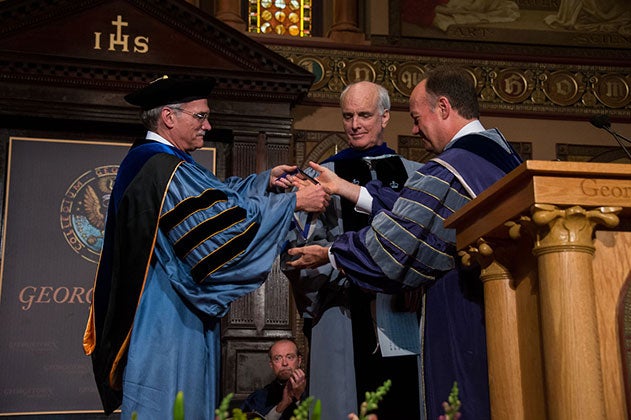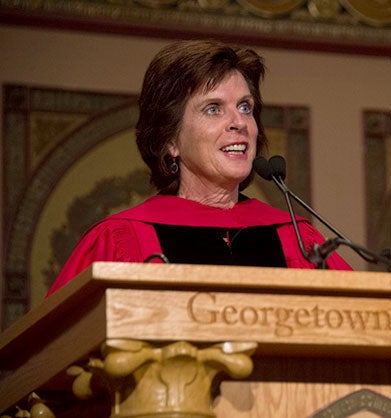Title: Faculty Receive Prestigious Medals as Presidential Fellows at Convocation
Georgetown recognizes the teaching and scholarship of three distinguished professors representing the fields of history, law and medicine as well as the tenure achievements of 22 faculty members during Fall Faculty Convocation.

OCTOBER 15, 2014–MEMBERS OF THE UNIVERSITYcommunity gathered to recognize the teaching and scholarship of three distinguished professors representing the fields of history, law and medicine as well as the tenure achievements of 22 faculty members during yesterday’s Fall Faculty Convocation.
For the second year in a row, Georgetown awarded the prestigious Presidential Fellows medals, designed to recognize faculty who excel in both research accomplishments and teaching effectiveness.
Georgetown President John J. DeGioia and Provost Robert Groves presented medals to this year’s Fellows James Collins, professor of history; Philip Schrag, Delaney Professor of Public Interest Law; and the late Karen Gale, professor of pharmacology and physiology.
“[These faculty] teach us every day that these two sides of an academic are not in conflict, but can be jointly achieved,” Groves said during the ceremony in Gaston Hall. “As the years progress, the group of Presidential Fellows will represent a definition of what is the best at Georgetown.”
EXTRAORDINARY COLLEAGUE AND MENTOR
Collins joined the faculty at Georgetown in 1985. During his 29 years at the university, he has served as the director of graduate studies in history and chair of the history department.
He has most recently lived, taught and lectured in Paris, Florence, Warsaw and London. In spring 2011, he was guest professor at the Ecole des Hautes Etudes en Sciences Socialesin Paris. In spring 2013, he was guest professor at theCollege de France.
“An extraordinary colleague, mentor, teacher and scholar, Dr. Collins exemplifies the commitment to excellence that animates these awards,” DeGioia said before giving Collins his medal. “And we are honored by the contributions he has made and by this opportunity to recognize him for his work.”
DEDICATED PUBLIC SERVANT
Schrag, who will receive his medal during a later event this semester at the Law Center, is a pioneer of clinical legal education in the United States.
The legal scholar joined Georgetown in 1981, and is co-author of two of the earliest articles about clinical legal education. He has since written four books about the subject as well as dozens of articles and 15 other books, includingEthical Problems in the Practice of Law– the most frequently assigned textbook of professional responsibility courses.
Schrag founded Georgetown’s Center for Applied Legal Studies – now a political asylum clinic, where students train how to conduct culturally sensitive interviews of traumatized clients, write a brief, and argue before a federal judge.
He also helped create the university’s Public Interest Law Scholars Program in 1988 and, in 2007, worked with Congress to create the Public Loan Forgiveness Program, which allows the federal government to provide substantial forgiveness of student debt to graduates who perform 10 years of full-time public service.
“As a dedicated public servant, an extraordinary and innovative teacher and an exceptional scholar, professor Schrag represents the very best of Georgetown,” DeGioia said. “It is an honor to have him as a member of our community and a recipient of this award.”
INTERDISCIPLINARY LEADERSHIP
As the evening’s third awardee, Gale was honored posthumously for her breadth of significant contributions to the field of epilepsy and interdisciplinary leadership.
Gale, who died this past August, had served as a chartered member of a National Institutes of Health (NIH) study section and a regular reviewer for the NIH director’s New Innovator Awards.
The NIH funded her projects for more than 20 years and awarded her more than $10 million to conduct her seminal research.
In 1994, she founded Georgetown’s Interdisciplinary Program in Neuroscience and served as its founding director. Now ranked the nation’s 14th highest Ph.D. program in neuroscience by the National Research Council, the program is one of only 28 neuroscience graduate training programs to receive NIH funding and boasts more than 50 faculty members from 11 departments campus-wide.
“We had the extraordinary privilege of Dr. Gale’s leadership and service at our university for more than four decades, and there is no one more deserving of an award that celebrates scholarship and teaching than Karen,” DeGioia said.
AIMS OF EDUCATION

Louise Richardson, principal-vice chancellor for the University of St. Andrews in Scotland, delivers the Aims of Education address during the Fall Faculty Convocation.
Louise Richardson, principal-vice chancellor for the University of St. Andrews in Scotland, delivered the convocation’s annual Aims of Education address, noting that when Georgetown was founded in 1789, St. Andrews had been around for more than 300 years. Yet, she said, the common foundation of education for Scotland’s oldest university and the world’s third-oldest English-speaking university remains:
“We have lasted this long because of the enduring value of what we, and you, do because we serve as foundations for our democracies,” she said, “as guardians of our cultures, as engines of our economies, as drivers of social mobility and always as generators of new ideas.”
TENURE MILESTONES
Faculty members from Main Campus, the Law Center and Medical Center also received recognition for their milestone achievements of tenure or further advancement in rank. They include:
Christopher Albanese, professor of oncology and pathology
Ali Arab, associate professor of mathematics and statistics
Caetlin Benson-Allott, associate professor of English
Jacques Berlinerblau, professor of foreign service
Daniel Blair, associate professor of physics
Alfiee Breland-Noble associate professor of psychiatry
Gianni Cicali associate professor of Italian
Erin Cline associate professor of theology
Nathan Edwards, associate professor of biochemistry and molecular cellular biology.
Kristi Graves, associate professor of oncology
Shiloh Krupar, associate professor of foreign service
Joanna Lewis, associate professor of foreign service
George Luta, associate professor of oncology and biostatistics, bioinformatics and biomathematics
Kathleen Maguire-Zeiss, associate professor of neuroscience
Andrei Medvedev associate professor of neurology
Robert Patterson, associate professor of English
Steven Singer, professor of biology
Lahra Smith, associate professor of foreign service
Noel Sugimura, associate professor of English
Joshua Teitelbaum, professor of law
Anna von der Goltz, associate professor of foreign service
James Vreeland, professor of foreign service and government
Judy Wang, associate professor of oncology